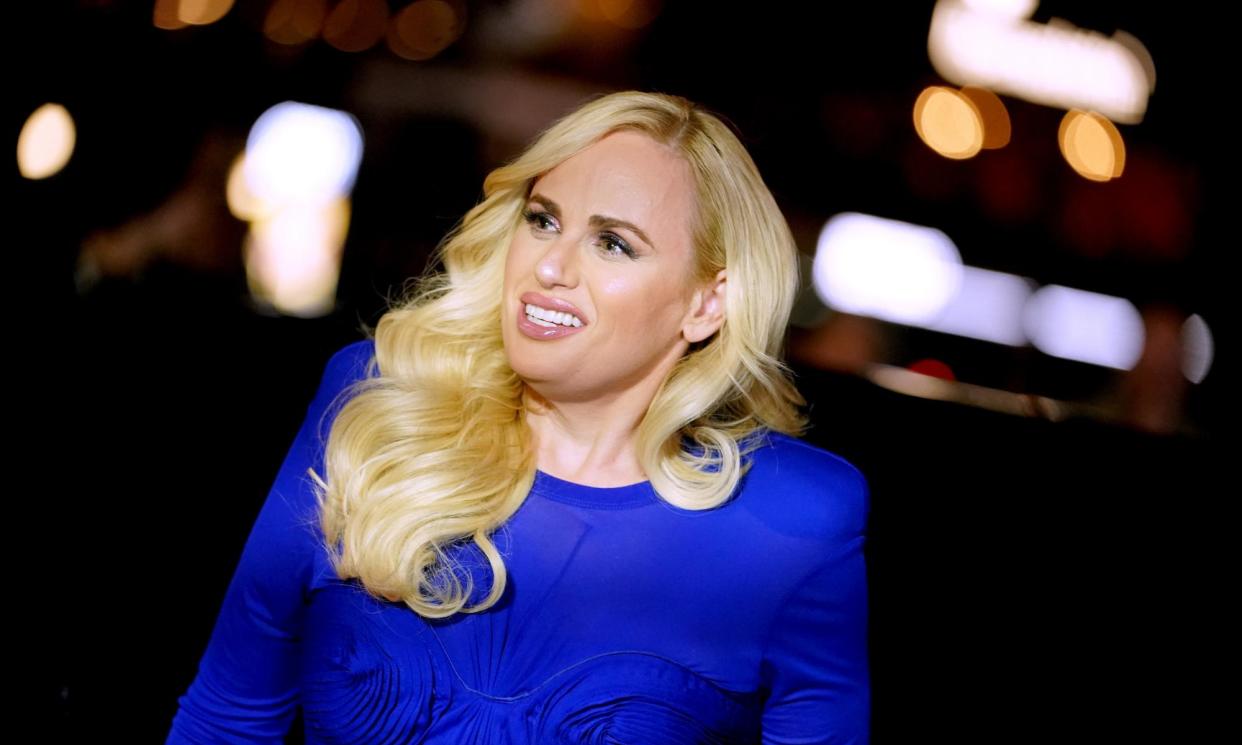Three producers suing Rebel Wilson seek to delay case to investigate who is behind website that published ‘grotesque lies’

The three producers suing Rebel Wilson for defamation have requested a 90-day stay in the Los Angeles superior court to establish the source of an anonymous website that they say accuses one of them of being an “Indian Ghislaine Maxwell”.
Defamation proceedings against Wilson, 44, were launched in July, after the Australian actor made claims to her 11 million Instagram followers that the producers of her film The Deb had engaged in theft, bullying and sexual misconduct.
The producers allege in court documents that Wilson fabricated “false and malicious lies” on Instagram in retribution for the producers’ refusal to grant her writing and music credits.
Lawyers acting for Amanda Ghost, Gregor Cameron and Vince Holden lodged documents on Tuesday alleging that shortly after they initiated the defamation action Wilson sent them a series of emails threatening to “very publicly ruin them”, including one on 29 July warning she was poised for “going public”.
Related: Rebel Wilson memoir: entire chapter on Sacha Baron Cohen redacted from book in Australia
Two days later an anonymous website was registered, the producers’ lawyers say, where “grotesque lies” were made, including allegations that Ghost, who is of Indo–Trinidadian heritage, was the “Indian Ghislaine Maxwell”.
“Failing in music she turned full pimp, reinventing herself as a theatrical producer alongside her husband [co-producer of The Deb, Gregor Cameron] while really procuring young women for the pleasure of the extremely wealthy,” the website alleged.
In October, Wilson launched a countersuit against her producers, repeating in her cross-complaint many of the allegations she had initially made on Instagram. Last week she filed a motion to strike the defamation claims against her, under California’s anti-Slapp laws, designed to protect freedom of speech on matters of public interest.
The anti-Slapp case is due to be heard on 21 November, but on Tuesday lawyers acting for the producers moved to delay the hearing. They lodged a motion for 90 days leave to take targeted discovery, with the source of the anonymous website at the core of their ongoing investigations.
There was “ample reason to believe that discovery will yield further evidence that Wilson has aggressively spread such rumours about the plaintiffs”, the motion says, thereby proving “an inference of actual malice” which would strike Wilson’s anti-Slapp motion.
Since Wilson’s original Instagram post in early July, in which she expressed fear her debut film as director would “get buried” because of her producers’ alleged behaviour (the film subsequently premiered at the Toronto film festival), the accusations and counter-accusations have become increasingly acrimonious.
The producers allege the relationship with Wilson began to deteriorate when she used bullying and extortion to “get credit and payment for work she did not do, and to overshadow young, upcoming artists who truly deserved the credit”.
The script for The Deb was the end product of a Rebel Wilson Theatremakers Scholarship, administered through the Australian Theatre for Young People. It was won by Hannah Reilly, who is credited as the writer of the film. The producers also claim Wilson attempted to gain credit as a writer of the film’s music, which is attributed to Meg Washington.
The dispute over copyright was eventually taken to the Australian Writers’ Guild for arbitration, which found in Reilly and the producers’ favour.
An AWG spokesperson told the Guardian the guild did not comment on individual arbitrations.
“The Australian Writers’ Guild administers binding credit arbitration on behalf of its members to ensure fairness and transparency in the allocation of writers’ credits,” the spokesperson said, adding this arbitration was accepted by guilds and the industry in general internationally.
Related: Rebel Wilson says idea only gay actors can play gay roles ‘is total nonsense’
“For years, Rebel has played the affable funny girl on the big screen and, off screen, portrayed herself as the champion of other female artists and whistleblower against abusive conduct within the film industry,” the producers’ defamation case claims.
“This public persona, however, is a farce. Rebel is a bully who will disregard the interests of others to promote her own.”
The claim also alleges Wilson fabricated allegations of inappropriate behaviour against her Grimsby co-star Sacha Baron Cohen to promote the sale of her memoir Rebel Rising, published earlier this year.
“Rebel has run this playbook one time too many,” the claim states.
In her cross-complaint, Wilson alleges the three producers undermined The Deb by “engaging in reprehensible and unlawful conduct”, which included Ghost sexually harassing the lead actress, Charlotte MacInnes, causing the 24-year-old to have a breakdown.
Wilson claims that after complaints over Ghost’s alleged misconduct reached her husband, co-producer Cameron, he allegedly unlawfully imprisoned her and two local Australian producers by confining them to a small room and refusing to allow them to leave until she withdrew her complaint against his wife. Cameron denies these claims.
MacInnes has since released a public statement saying there was “no truth” to Wilson’s allegations and she refused to “be the subject of a fabricated narrative”.
Wilson also accused her producers of “scheming to embezzle” A$900,000 from the film’s budget, and “continuously bullying and harassing” her to sign documents under duress – claims that the producers deny.
High-profile California entertainment lawyers have now been engaged on both sides.
Ghost, Cameron and Holden have hired the LA celebrity lawyer Camille Vasquez, who successfully represented Johnny Depp in the defamation action he brought against his wife Amber Heard. Vasquez has also represented Hollywood A-listers Ben Affleck, Leonardo DiCaprio and Jennifer Lopez.
Wilson has engaged a Beverly Hills entertainment legal firm led by Bryan Freedman, who represented the Michael Jackson estate in a lawsuit against HBO over allegations of child sexual abuse made in the 2019 documentary Leaving Neverland.

 Yahoo Movies
Yahoo Movies 
